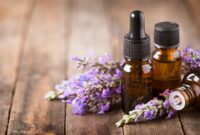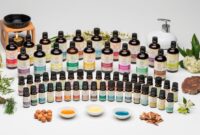In the realm of natural healing, good essential oils stand out as aromatic treasures, offering a myriad of therapeutic benefits. From relaxation to pain relief, these potent plant extracts have been used for centuries to enhance well-being and promote health.
Discover the fascinating world of essential oils, where nature’s essence meets scientific validation. Explore their therapeutic properties, learn how to incorporate them into your daily life, and embrace the transformative power of these aromatic wonders.
Essential Oil Basics
Essential oils are natural compounds extracted from plants. They are highly concentrated and volatile, giving them a strong aroma. Essential oils have been used for centuries in aromatherapy, a form of alternative medicine that uses smell to promote relaxation and well-being.
Essential oils are extracted from plants using various methods, including:
- Steam distillation: This method involves passing steam through the plant material, which causes the essential oils to evaporate. The steam and essential oils are then condensed and separated.
- Cold pressing: This method involves pressing the plant material to extract the essential oils. Cold pressing is often used for citrus fruits, such as oranges and lemons.
- Solvent extraction: This method involves using a solvent, such as alcohol or hexane, to dissolve the essential oils from the plant material. The solvent is then evaporated, leaving behind the essential oils.
There are many different types of essential oils, each with its own unique properties. Some of the most common essential oils include:
- Lavender oil: Lavender oil is known for its calming and relaxing effects. It is often used to promote sleep and reduce stress.
- Peppermint oil: Peppermint oil is known for its invigorating and stimulating effects. It is often used to improve focus and concentration.
- Tea tree oil: Tea tree oil is known for its antibacterial and antifungal properties. It is often used to treat skin infections and acne.
Benefits of Essential Oils

Essential oils are concentrated plant extracts that have been used for centuries for their therapeutic properties. They are highly volatile and can be easily absorbed through the skin or inhaled. Essential oils have a wide range of potential benefits, including:
Aromatherapy:Inhaling essential oils can have a calming or stimulating effect on the mind and body. For example, lavender oil is often used to promote relaxation and sleep, while peppermint oil can help to improve alertness and focus.
Topical application:Essential oils can be diluted and applied to the skin to treat a variety of conditions, such as acne, eczema, and muscle pain. For example, tea tree oil has antibacterial and anti-inflammatory properties that make it effective for treating acne, while eucalyptus oil can help to relieve muscle pain.
Internal use:Some essential oils can be taken internally, but this should only be done under the guidance of a qualified healthcare practitioner. Internal use of essential oils can be beneficial for conditions such as digestive problems, respiratory infections, and hormonal imbalances.
Scientific Evidence
There is a growing body of scientific evidence to support the use of essential oils for a variety of conditions. For example, a study published in the journal Complementary Therapies in Medicinefound that lavender oil was effective in reducing anxiety and improving sleep quality in people with insomnia.
Another study, published in the journal Phytotherapy Research, found that tea tree oil was effective in treating acne. The study participants who used tea tree oil experienced a significant reduction in acne lesions compared to the participants who used a placebo.
Essential Oils for Specific Needs
Essential oils have been used for centuries to treat a variety of ailments. Today, they are still popular for their therapeutic properties, and many people use them to improve their health and well-being.
There are many different essential oils available, each with its own unique benefits. Some of the most popular essential oils include lavender, peppermint, eucalyptus, and tea tree oil.
Essential Oils for Specific Needs
Essential oils can be used to treat a variety of specific needs, including:
| Essential Oil | Benefits | Uses | Precautions |
|---|---|---|---|
| Lavender | Relaxing, calming, promotes sleep | Aromatherapy, massage, baths | Avoid during pregnancy and breastfeeding |
| Peppermint | Cooling, invigorating, relieves headaches | Aromatherapy, topical application | Avoid using on children under 6 years old |
| Eucalyptus | Decongestant, expectorant, antimicrobial | Aromatherapy, steam inhalation, topical application | Avoid using on children under 6 years old |
| Tea Tree Oil | Antiseptic, antifungal, antibacterial | Topical application, aromatherapy | Avoid using on children under 6 years old |
Quality and Safety of Essential Oils

Essential oils are potent plant extracts that offer various benefits. However, using high-quality oils is crucial to ensure their efficacy and safety. Low-quality oils may contain adulterants, fillers, or synthetic ingredients that can dilute their therapeutic properties or pose potential health risks.
Choosing High-Quality Essential Oils
* Purity:Look for oils labeled as “100% pure” or “therapeutic grade.” These oils are extracted using methods like steam distillation or cold pressing, preserving their natural constituents.
Botanical Name
Verify that the oil label clearly states the botanical name of the plant from which it was derived. This ensures you’re getting the correct oil and not a synthetic substitute.
Organic Certification
Choose oils certified organic by reputable organizations like USDA or Ecocert. This guarantees that the plants were grown without synthetic pesticides or fertilizers.
Company Reputation
Research the company producing the oils. Look for reputable brands with a track record of producing high-quality products.
Potential Risks and Precautions
* Skin Irritation:Some essential oils can cause skin irritation, especially when applied undiluted. Always dilute oils in a carrier oil like coconut or jojoba oil before topical application.
Ingestion
Essential oils are highly concentrated and should never be ingested orally unless under the guidance of a qualified healthcare professional.
Pregnancy and Children
Certain oils may not be safe for pregnant women or children. Consult with a healthcare professional before using essential oils during these stages.
Drug Interactions
Some essential oils may interact with certain medications. Always inform your doctor about any essential oils you’re using.
Tips for Safe Storage, Good essential oils
* Cool and Dark:Store essential oils in a cool, dark place away from direct sunlight. Light and heat can degrade the oils’ chemical composition.
Amber Glass Bottles
Use amber glass bottles to store oils as they protect against light exposure.
Tightly Sealed
Keep bottles tightly sealed to prevent evaporation and oxidation.
Refrigeration
Some oils, such as citrus oils, can benefit from refrigeration to extend their shelf life.
Essential Oils in Everyday Life
Essential oils offer a versatile and effective way to enhance daily routines for overall well-being. By incorporating them into household cleaning, personal care rituals, and relaxation practices, individuals can harness their therapeutic properties to create a healthier and more balanced environment.
Household Cleaning
Essential oils can be utilized as natural cleaning agents, effectively eliminating germs and bacteria while leaving behind a refreshing scent. Create a DIY all-purpose cleaner by mixing 10 drops of lemon oil, 5 drops of tea tree oil, and 2 cups of water in a spray bottle.
Shake well and use it to clean countertops, floors, and other surfaces.
Personal Care
Essential oils can elevate personal care routines, promoting healthy skin, hair, and nails. For a soothing bath experience, add 5-10 drops of lavender or chamomile oil to warm bathwater. To create a nourishing hair mask, combine 2 tablespoons of coconut oil with 5 drops of rosemary oil and apply it to hair for 30 minutes before washing.
Relaxation Rituals
Essential oils are renowned for their calming and stress-relieving properties. To create a relaxing atmosphere, diffuse 5-10 drops of bergamot or orange oil in an essential oil diffuser. Alternatively, add a few drops of lavender oil to a warm bath or apply it topically to the temples and wrists for a calming effect.
Simple Recipes and Blends
- Air Freshener:Mix 5 drops of lemon oil, 5 drops of eucalyptus oil, and 2 cups of water in a spray bottle.
- Bug Repellent:Blend 10 drops of peppermint oil, 5 drops of citronella oil, and 2 cups of water in a spray bottle.
- Stress Relief Blend:Combine 5 drops of lavender oil, 3 drops of bergamot oil, and 2 drops of frankincense oil in a diffuser.
Final Summary

As we conclude our exploration of good essential oils, it’s evident that these natural remedies hold immense potential for enhancing our physical, emotional, and spiritual well-being. Embrace their versatility, from aromatherapy to topical applications, and unlock a world of natural healing and holistic wellness.
Common Queries: Good Essential Oils
What are essential oils?
Essential oils are concentrated plant extracts that capture the aromatic and therapeutic properties of the plants from which they are derived.
How are essential oils extracted?
Essential oils can be extracted through various methods, including steam distillation, cold pressing, and solvent extraction.
Are essential oils safe to use?
While essential oils offer numerous benefits, it’s crucial to use them safely. Always dilute them with a carrier oil before topical application, avoid internal use unless under the guidance of a qualified healthcare professional, and keep them out of reach of children and pets.


